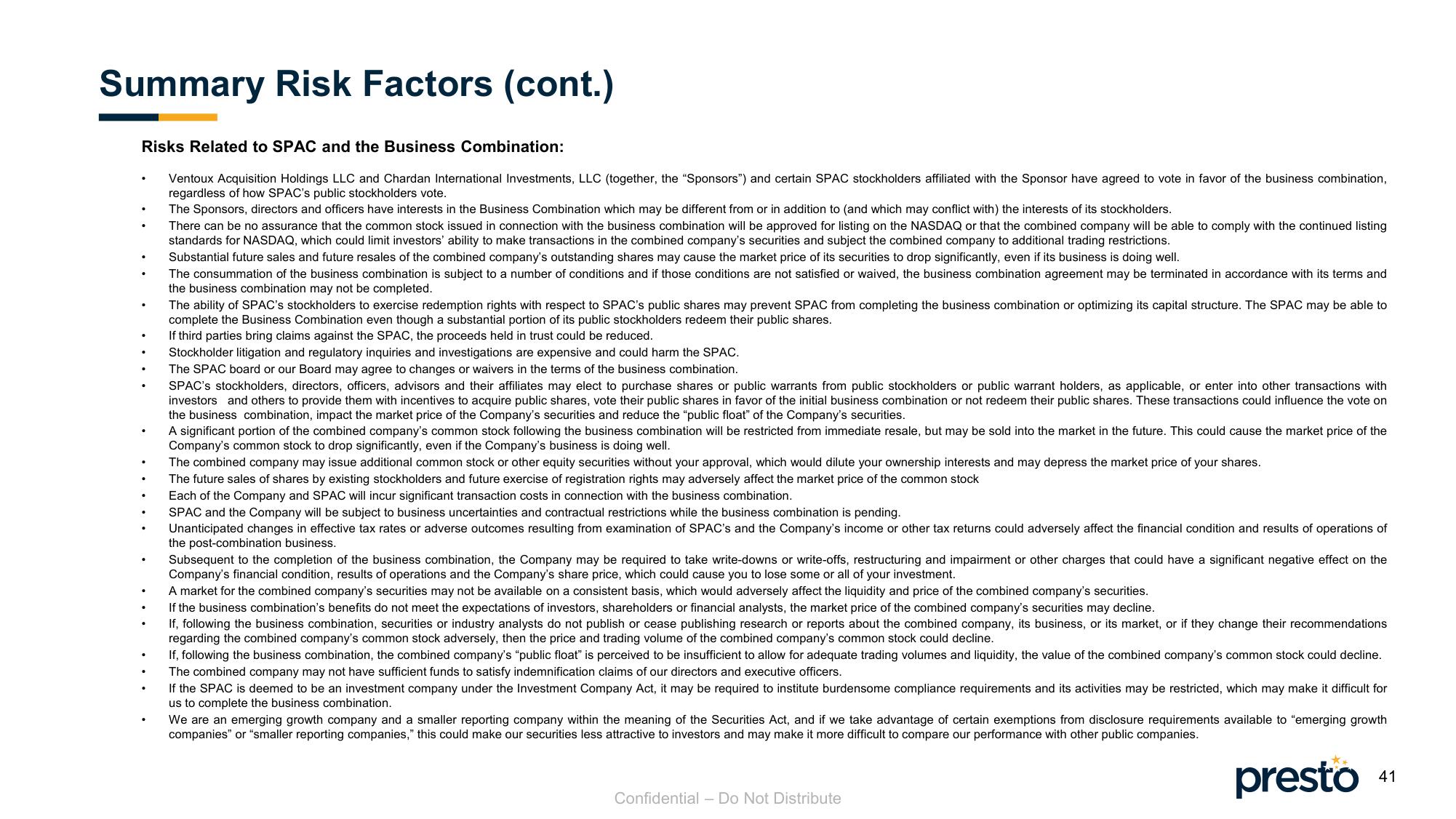Presto SPAC Presentation Deck
Summary Risk Factors (cont.)
Risks Related to SPAC and the Business Combination:
Ventoux Acquisition Holdings LLC and Chardan International Investments, LLC (together, the "Sponsors") and certain SPAC stockholders affiliated with the Sponsor have agreed to vote in favor of the business combination,
regardless of how SPAC's public stockholders vote.
The Sponsors, directors and officers have interests in the Business Combination which may be different from or in addition to (and which may conflict with) the interests of its stockholders.
.
.
.
.
There can be no assurance that the common stock issued in connection with the business combination will be approved for listing on the NASDAQ or that the combined company will be able to comply with the continued listing
standards for NASDAQ, which could limit investors' ability to make transactions in the combined company's securities and subject the combined company to additional trading restrictions.
Substantial future sales and future resales of the combined company's outstanding shares may cause the market price of its securities to drop significantly, even if its business is doing well.
The consummation of the business combination is subject to a number of conditions and if those conditions are not satisfied or waived, the business combination agreement may be terminated in accordance with its terms and
the business combination may not be completed.
The ability of SPAC's stockholders to exercise redemption rights with respect to SPAC's public shares may prevent SPAC from completing the business combination or optimizing its capital structure. The SPAC may be able to
complete the Business Combination even though a substantial portion of its public stockholders redeem their public shares.
If third
bring claims against the SPAC, the proceeds held in trust could be reduced.
Stockholder litigation and regulatory inquiries and investigations are expensive and could harm the SPAC.
The SPAC board or our Board may agree to changes or waivers in the terms of the business combination.
SPAC's stockholders, directors, officers, advisors and their affiliates may elect to purchase shares or public warrants from public stockholders or public warrant holders, as applicable, or enter into other transactions with
investors and others to provide them with incentives to acquire public shares, vote their public shares in favor of the initial business combination or not redeem their public shares. These transactions could influence the vote on
the business combination, impact the market price of the Company's securities and reduce the "public float" of the Company's securities.
A significant portion of the combined company's common stock following the business combination will be restricted from immediate resale, but may be sold into the market in the future. This could cause the market price of the
Company's common stock to drop significantly, even if the Company's business is doing well.
The combined company may issue additional common stock or other equity securities without your approval, which would dilute your ownership interests and may depress the market price of your shares.
The future sales of shares by existing stockholders and future exercise of registration rights may adversely affect the market price of the common stock
Each of the Company and SPAC will incur significant transaction costs in connection with the business combination.
SPAC and the Company will be subject to business uncertainties and contractual restrictions while the business combination is pending.
Unanticipated changes in effective tax rates or adverse outcomes resulting from examination of SPAC's and the Company's income or other tax returns could adversely affect the financial condition and results of operations of
the post-combination business.
Subsequent to the completion of the business combination, the Company may be required to take write-downs or write-offs, restructuring and impairment or other charges that could have a significant negative effect on the
Company's financial condition, results of operations and the Company's share price, which could cause you to lose some or all of your investment.
A market for the combined company's securities may not be available on a consistent basis, which would adversely affect the liquidity and price of the combined company's securities.
If the business combination's benefits do not meet the expectations of investors, shareholders or financial analysts, the market price of the combined company's securities may decline.
If, following the business combination, securities or industry analysts do not publish or cease publishing research or reports about the combined company, its business, or its market, or if they change their recommendations
regarding the combined company's common stock adversely, then the price and trading volume of the combined company's common stock could decline.
If, following the business combination, the combined company's "public float" is perceived to be insufficient to allow for adequate trading volumes and liquidity, the value of the combined company's common stock could decline.
The combined company may not have sufficient funds to satisfy indemnification claims of our directors and executive officers.
If the SPAC is deemed to be an investment company under the Investment Company Act, it may be required to institute burdensome compliance requirements and its activities may be restricted, which may make it difficult for
us to complete the business combination.
We are an emerging growth company and a smaller reporting company within the meaning of the Securities Act, and if we take advantage of certain exemptions from disclosure requirements available to "emerging growth
companies" or "smaller reporting companies," this could make our securities less attractive to investors and may make it more difficult to compare our performance with other public companies.
presto
Confidential - Do Not Distribute
41View entire presentation